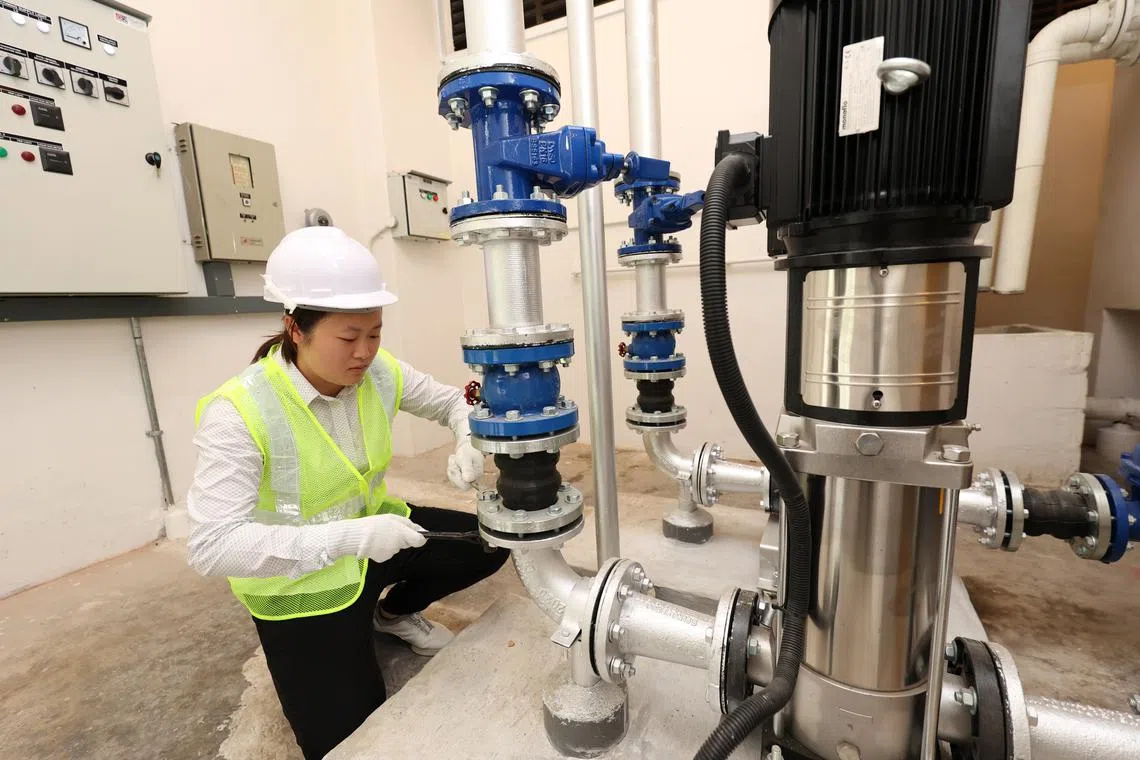New model proposed by NTUC to boost salaries and careers of tradesmen like plumbers, electricians
Sign up now: Get ST's newsletters delivered to your inbox

The Career Progression Model will give a level of certainty to workers who are not in the industry yet.
PHOTO: LIANHE ZAOBAO
SINGAPORE – To attract more young people to work in skilled tradesmen jobs like plumber and electrician services, a new framework has been proposed to create clear career ladders for these essential workers.
National Trades Union Congress (NTUC) secretary-general Ng Chee Meng on Thursday outlined the labour movement’s intention to uplift the work prospects and wages of skilled essential tradesmen through the framework, termed the Career Progression Model.
This follows the introduction of the Progressive Wage Model in 2012, which has since helped Singapore citizens and permanent residents who are lower-wage workers, such as cleaners and security officers, to earn higher wages by upgrading their skills and improving productivity.
Similarly, if the new framework comes to pass, workers in the skilled trades industry will benefit from structured skills training that will lead to better career prospects and salaries.
It will also define more training pathways from tertiary education into skilled essential trades, and publicise clear and transparent quality standards for the respective sectors.
NTUC will first prioritise three skilled trades that have a direct effect on the daily lives of Singaporeans: plumbers, electricians and air-conditioning and mechanical ventilation mechanics.
Other types of skilled tradesmen include metal and machinery workers, as well as workers in the building trade.
Overall, more than 50,000 locals ply these essential trades in Singapore.
But the industry is weighed down by challenges such as a lack of younger hires as the tradesmen workforce ages, said Mr Ng, who was visiting a plumbing maintenance site of mechanical contractor company JD Waters in Teck Whye on Thursday.
More than half of tradesmen in Singapore are currently above 50 years old, according to the Singapore Labour Force Survey in 2022.
The median monthly wage of these skilled trade workers was about $2,600 in 2022, which is near the threshold for lower-wage workers.
“There is a national need to ensure that essential services such as water and power are safeguarded. If the current challenges facing skilled essential trades are not addressed, we will see a critical lack of local expertise in these sectors in 10 years’ time,” said Mr Ng.
“That is why we are proposing the development of the Career Progression Model for skilled essential tradesmen, so that they can have a viable career in these trades and to sustain the continued supply of local talent in these sectors.”
The Career Progression Model will give a level of certainty to workers who are not in the industry yet, said Mr Ng.
“One can become a licensed plumber at any stage in life, but there is no stipulated career progression after that. The progression model will provide ladders in the industry so that young people coming out of school can look forward to a competency framework that can help them to upgrade their skills and license them for a better career,” he added.
Ms Geraldine Goh, 29, decided to become a plumber as she prefers outdoor jobs over office jobs.
“I first started working in town council as an officer where I followed contractors around and watched how they worked. Then plumbing caught my interest,” said Ms Goh, who has worked as a plumber for almost six years. She started a skilled trades company in 2017, and is pursuing a part-time degree in building and project management at the Singapore University of Social Sciences.
She believes that there are young people interested in maintenance work as a career but do not know how to kick-start their journey as trades are not brought up or discussed as often as other careers while in school.
“We want to be paid more (with the proposed framework). In order to be paid more, we need to do more. For plumbing, we need to understand not just about piping, but also the mechanical part of it, such as electrical parts of the system,” said Ms Goh.
Freelance plumber Noor Danial, 35, noted that the public may not have a glowing image of the sector.
“People think that plumbing is a dirty job that’s only about changing taps, pipes and fixing sinks. But the truth is that we do more than that,“ said Mr Danial, who has worked as a plumber for seven years and is also a built environment lecturer in an Institute of Higher Learning.
Mr Danial, who graduated with a degree in project and facilities management from the National University of Singapore, first gained an interest in plumbing while working in estate management. Then, he worked with contractors to fix plumbing issues.
“The best part of the job is seeing clients forget their problems. The smiles on their faces after we fix their plumbing issues is something we remember for a long time,” he added.
NTUC said that it will continue to engage the relevant stakeholders, unions, tradesmen, and trade associations to gather their feedback to work on the proposed framework for skilled essential tradesmen.
An #EveryWorkerMatters Conversation will be held with tradesmen on Feb 23.


